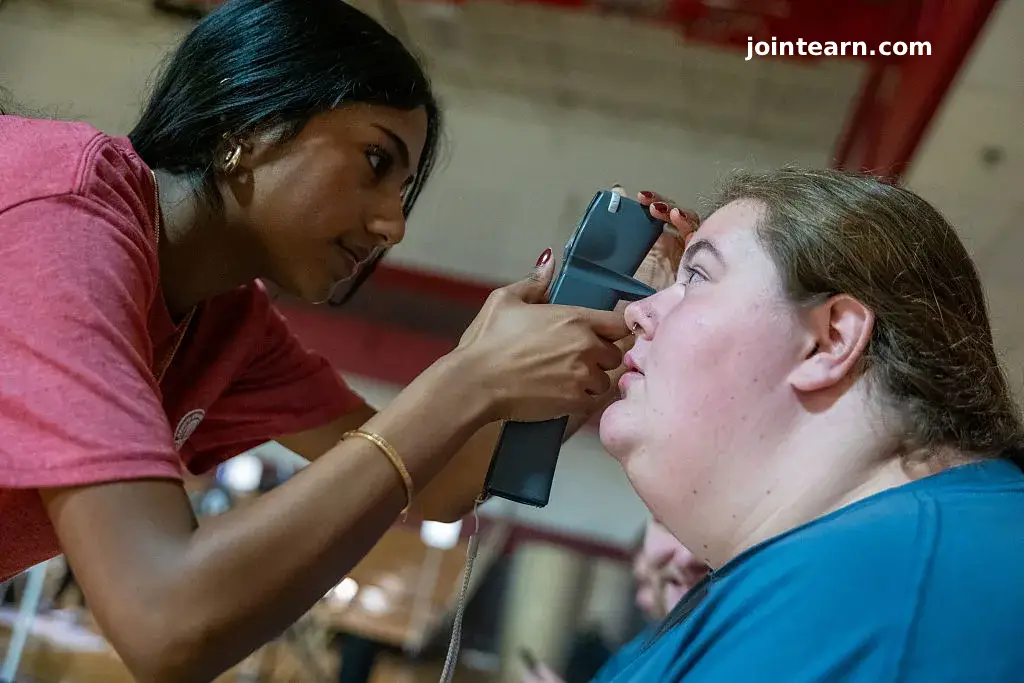
Washington, D.C. – Trump’s $100,000 H-1B Visa Fee Could Worsen Rural Doctor Shortages, Experts Warn
A newly announced $100,000 fee for H-1B visas under President Donald Trump’s administration has ignited widespread concern among medical professionals and healthcare organizations. Experts say the policy threatens to exacerbate the ongoing shortage of physicians in rural and underserved communities across the United States.
Many immigrant physicians, who account for nearly a quarter of all licensed U.S. doctors, have long relied on H-1B visas to work in communities that struggle to recruit and retain medical professionals. States such as Kentucky, Mississippi, Iowa, West Virginia, and North Dakota have particularly benefited from the contributions of foreign-trained doctors serving rural areas.
Impact on Rural Healthcare Access
Endocrinologist Dr. Manikya Kuriti, who serves rural communities surrounding Louisville, Kentucky, exemplifies the critical role of immigrant physicians. Her husband, pulmonologist Dr. Vinay Nidadavolu, travels an hour from Louisville to neighboring hospitals in Indiana to treat critically ill patients. Many patients drive up to two hours to access care provided by this small network of physicians.
Rural hospitals nationwide have faced financial difficulties, leading to service reductions or closures. These communities, already dealing with higher rates of chronic illnesses and early mortality compared to urban areas, depend heavily on immigrant physicians to fill staffing gaps.
Policy Details and Opposition
The H-1B visa fee, announced last month, allows the Department of Homeland Security (DHS) to collect $100,000 per applicant, though it permits discretionary waivers if a worker is deemed in the “national interest” and poses no threat to U.S. security or welfare.
The American Medical Association (AMA) and more than 50 other organizations have urged DHS to exempt physicians, including medical residents, fellows, and researchers, from the fee, emphasizing their critical contribution to the national interest. Labor unions and advocacy groups, including the AFL-CIO Committee of Interns and Residents, have filed lawsuits arguing that the president lacks the authority to impose such a fee without congressional approval.
Projected Physician Shortages
According to the Association of American Medical Colleges, the U.S. could face a shortage of up to 86,000 doctors by 2036. Almost half of foreign-trained physicians work in rural or underserved areas, with tens of thousands employed under H-1B visas in these communities.
Former Health and Human Services Secretary Dr. Tom Price stressed that imposing significant fees on immigrant physicians will be detrimental, particularly in low-served rural areas. “A significant fee for any further H-1B visas in the area of the health care workforce will be detrimental,” Price said, highlighting the policy’s potential impact on patient care access.
Uncertainty for Hospitals and Medical Schools
Hospitals and medical institutions are struggling to navigate the new policy. The University of Washington, for example, has paused H-1B visa petitions due to uncertainty over who will bear the $100,000 fee—employers or physicians themselves. Dr. Tim Dellit, CEO of UW Medicine, warned that the disruption could hinder research, education, and clinical care.
Immigration lawyers predict that legal challenges may be necessary to clarify responsibilities, adding further uncertainty to the system.
Voices from the Frontlines
Dr. Sridevi Alla, a hospitalist in Jackson, Mississippi, emphasized the critical need for international medical graduates in rural areas. “In a state which already has a physician shortage, I think that’s definitely going to affect primary care,” she said. Physicians like Alla, who treat patients with diabetes, heart disease, and high-risk conditions, underscore the life-saving role of immigrant doctors in underserved regions.
Dr. Mette Strand, an internal medicine physician in Montana, echoed similar concerns. “Cutting IMGs, we would be in further need of doctors in an already underserved state,” she said. “I would have a hard time seeing how we would run our hospitals and our clinics.”
Conclusion
The Trump administration’s new H-1B visa fee has ignited urgent debates over healthcare access, rural doctor shortages, and immigration policy. With projected shortages in the coming decades, policymakers face growing pressure to exempt medical professionals from costly visa fees to ensure that underserved communities continue to receive essential care.


Leave a Reply